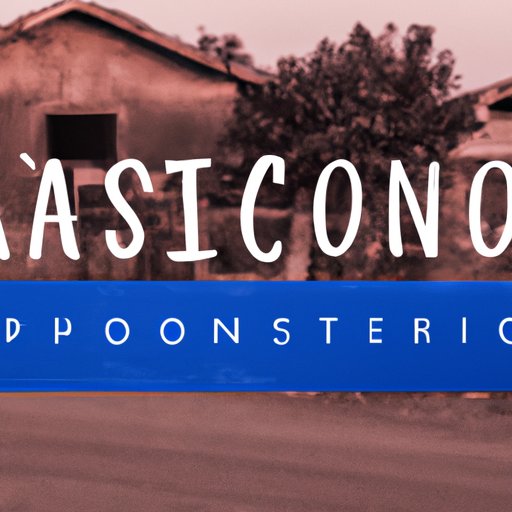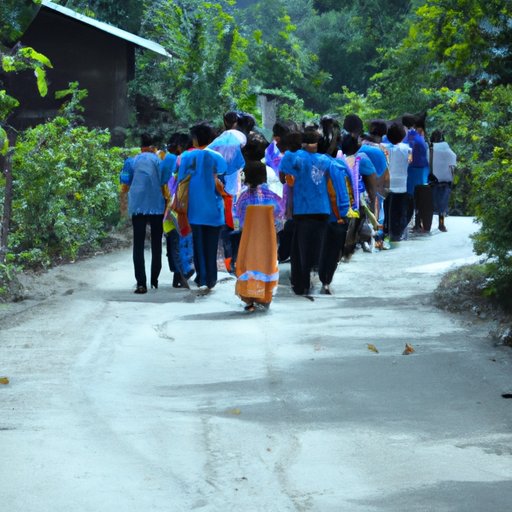Introduction
Mission trips are trips taken by religious people to countries in need of aid or evangelism. They involve volunteers travelling to provide relief work, such as building homes or churches, providing medical care, or teaching English. These trips can be seen as an opportunity to make a positive impact on the lives of those in need, but they can also raise ethical questions about their effectiveness and the potential impact on local communities.
Examining the Ethics of Mission Trips from a Religious Perspective
Religious organizations often view mission trips as a way to spread the gospel and promote their faith. From this perspective, mission trips are seen as an opportunity to help others and share the message of Christianity with those in need. However, there are ethical considerations to take into account when evaluating the effectiveness of these trips from a religious point of view.
One ethical concern is whether the mission trip is truly helping those in need, or if it is merely a way for the religious organization to gain converts. Mission trips should not be used as a tool for proselytizing, and any attempts to do so could be seen as unethical. Additionally, religious organizations should ensure that they are respectful of the beliefs, customs, and traditions of the local community. This means being aware of cultural differences and respecting the wishes of those who do not wish to be converted.

Exploring the Impact of Mission Trips on Local Communities
Mission trips have the potential to have both positive and negative impacts on local communities. On the one hand, they can provide much needed aid and resources to those in need. This can include medical treatment, food and supplies, and educational opportunities. Additionally, mission trips can foster relationships between volunteers and locals, which can lead to increased understanding and cooperation between cultures.
On the other hand, there are potential negative impacts of mission trips that must be considered. For example, there is the risk of creating a “dependency culture” in which locals rely on foreign aid rather than finding ways to help themselves. Additionally, mission trips can disrupt local cultures and economies, as well as lead to exploitation of locals by volunteers. To avoid these potential pitfalls, mission trip organizations should ensure that they are taking steps to promote ethical practices, such as engaging with local leaders, providing education and training opportunities, and ensuring that locals are given the opportunity to participate in the decision-making process.

Investigating the Pros and Cons of Mission Trips for Participants
Mission trips can also have an impact on the volunteers themselves. On the one hand, participating in a mission trip can be personally rewarding, as it provides an opportunity to help those in need and learn about different cultures. Additionally, mission trips can be beneficial for spiritual growth, as volunteers are able to develop a deeper understanding of their faith and how it applies to the world around them.
On the other hand, there are potential risks associated with mission trips. These include physical dangers, such as illness and injury, as well as emotional risks, such as culture shock and feelings of guilt or helplessness. Additionally, mission trips can be costly, both financially and in terms of time, and there is no guarantee that the trip will be successful or beneficial to those in need. For these reasons, it is important that volunteers are aware of the potential risks before embarking on a mission trip.
Debating the Effectiveness of Short-term Mission Trips
In recent years, there has been debate over the effectiveness of short-term mission trips. Some argue that these trips are too short to make a lasting impact, and that volunteers should instead focus their efforts on long-term projects that can provide more sustainable benefits to local communities. Others contend that short-term missions are still valuable, as they can provide immediate relief and open up new opportunities for both volunteers and locals.
It is important to consider the potential long-term impacts of short-term mission trips. In some cases, volunteers may return home with a better understanding of the issues facing those in need, and may become more involved in advocating for change. Additionally, mission trips can foster relationships between volunteers and locals, which can lead to increased understanding and cooperation between cultures. Ultimately, it is up to mission trip organizers to ensure that their trips are providing real and sustainable benefits to those in need.
Conclusion
Mission trips can be a powerful way to make a positive impact on the lives of those in need. However, it is important to consider the ethical implications of these trips from a religious perspective, and to be mindful of the potential impacts on both participants and local communities. Additionally, it is important to debate the effectiveness of short-term mission trips, and to ensure that trips are providing real and sustainable benefits to those in need. By following these guidelines, mission trips can be a powerful tool for making a positive difference in the world.
(Note: Is this article not meeting your expectations? Do you have knowledge or insights to share? Unlock new opportunities and expand your reach by joining our authors team. Click Registration to join us and share your expertise with our readers.)
